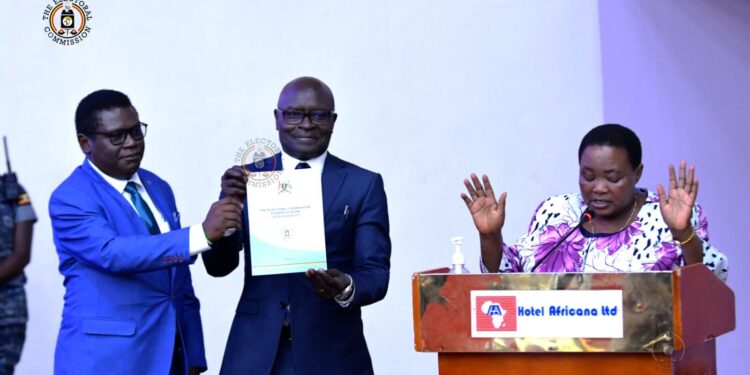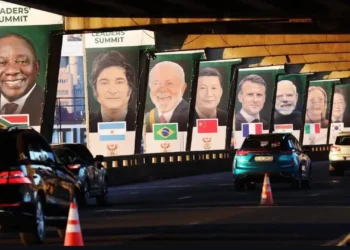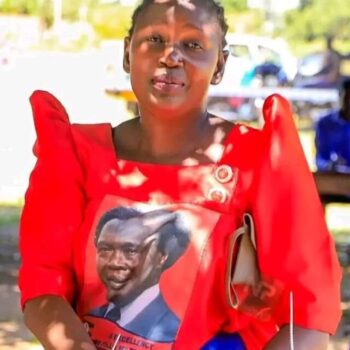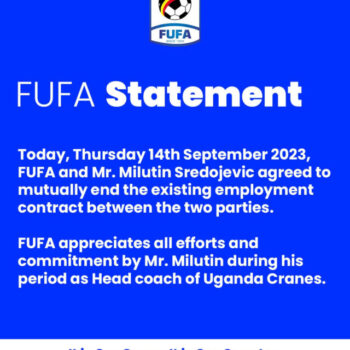The Uganda Electoral Commission (EC) thrilled aspiring candidates with the announcement of nomination dates for the next elections. They urged the Executive and Parliament to hasten constitutional and electoral reforms.
KAMPALA, UGANDA | NOW THEN DIGITAL — The Uganda Electoral Commission (EC) has made an important announcement regarding the dates for candidate nominations for the upcoming elections. In their recent statement, they have urged the Executive and Parliament to expedite the necessary constitutional and electoral reforms.
Yesterday, in Kampala, the EC released the highly anticipated 2026 poll roadmap, revealing that between June and October 2025, they will select presidential, parliamentary, and local government flag bearers.

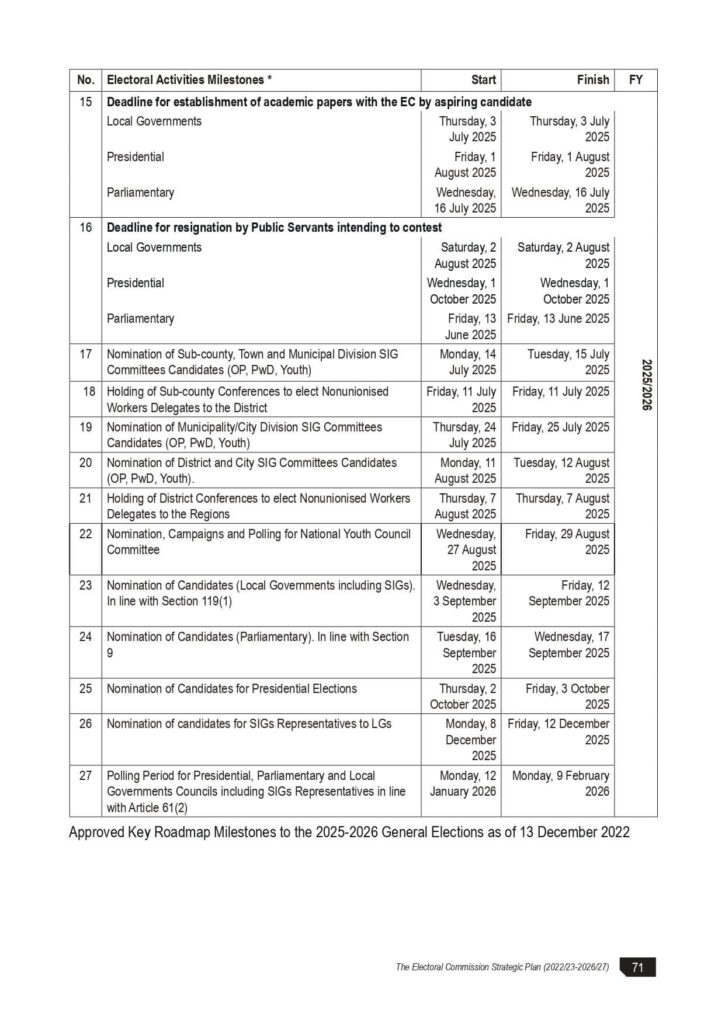
Mark your calendars: Presidential candidate nominations will take place on October 2-3, just a fortnight after the parliamentary contenders are nominated on September 16-17. On the same dates, September 16-17, the flag bearers for district chair and mayoral offices will also be nominated.
Before the major contenders, village special interest groups will get their chance to run for offices from June 2-10, followed by their counterparts in municipalities, sub-counties, and town councils on July 14-15.
Though these dates are approximately two years away, the disclosure is bound to ignite excitement among aspiring politicians and increase pressure on incumbents. However, it is worth noting that the EC issued a warning yesterday, cautioning political parties and organizations against initiating campaign-related activities prematurely.
Justice Simon Byabakama, the EC Chairman, emphasized that the release of the strategic plan and roadmap is not an invitation to plunge the country into a frenzy of campaign-related activities.
“The Commission wishes to caution political parties and organisations that the release of this strategic plan and roadmap is not meant to thrust the country into a frenzy of campaign-related activities for aspiring individuals, political parties, and organisations,” Justice Simon Byabakama said.
To ensure a smooth electoral process, the government must fulfill two crucial conditions: expediting the amendments to the Constitution and other election-related legislations and providing adequate funding in a timely manner to support preparatory activities leading up to the voting time.
To fund the next ballot, the Justice Byabakama-led Commission has requested Shs1.3 trillion, part of the Shs2.4 trillion required to execute the four-year strategic plan (2023/24-2026/27).
According to officials, the main drivers of the costs for the next general elections include an anticipated increase in the number of parliamentary and local government constituencies, ranging from several hundreds to thousands.
The Commission projects that there will be 6 million more voters than the last poll, bringing the total to 24 million. This will result in higher costs for enrolling new voters, updating the voters’ register, and printing more ballots.
Moreover, the EC expects that Parliament will either approve or create nine new cities/districts, leading to a significant increase in administrative units. The country is anticipated to have eight new city divisions, 37 constituencies, 1,000 sub-counties, 9,000 additional parishes, 3,310 parishes, and 9,500 villages by 2026, making a total of 14,000 parishes and 80,000 villages. This will substantially raise the administrative and logistical expenses.
In addition to these changes, the EC is determined to implement mechanisms for prisoners and Ugandans in the Diaspora to vote, necessitating constitutional amendments and changes to electoral laws.
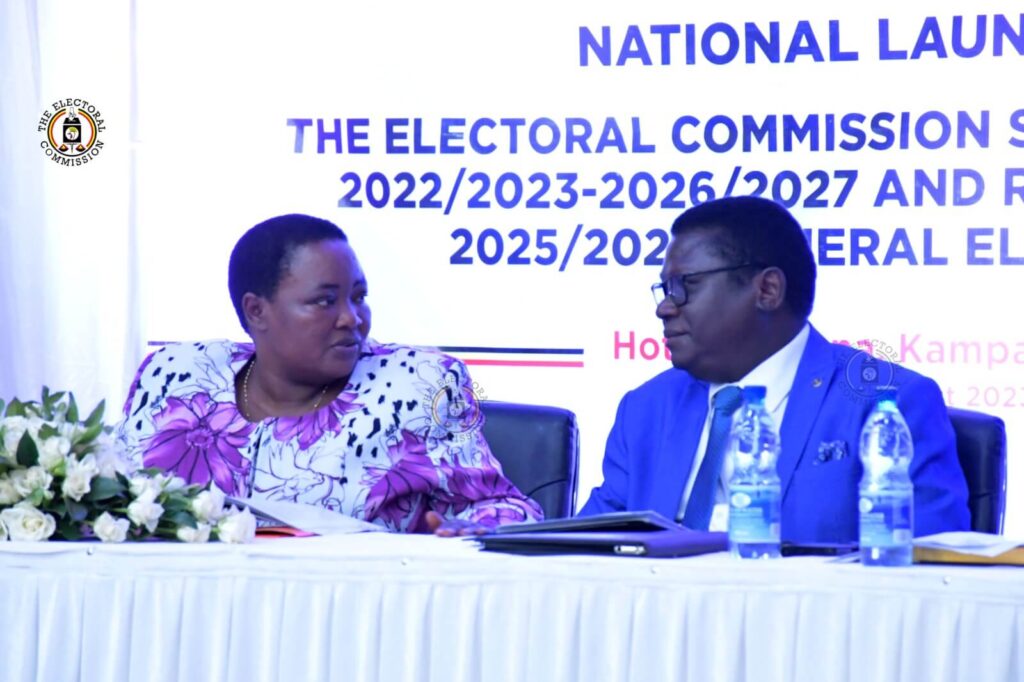
During a recent event, Mr. Gerald Siranda, the Democratic Party’s secretary general, urged Mr. Norbert Mao, the non-committal party President General and Justice and Constitutional Affairs minister, to disclose when he will present the reforms in Parliament.
Interestingly, Minister Mao chose a storytelling approach when questioned about the nature and timelines of the required reforms. He shared an anecdote about a boy who remained silent while his colleagues struggled with a question, only to surprise everyone by providing the correct answer.
The significance of this tale remains unclear, leaving some to speculate that it may imply that government commentators should be patient and wait for his official pronouncements.
At a separate event in Gulu City last month, Mr. Mao hinted that constitutional and electoral reforms would begin within three months.
On the other hand, Prime Minister Robinah Nabbanja, at the launch of the 2026 election blueprint in Kampala yesterday, expressed a commitment to follow up on the reforms suggested by various stakeholders to ensure a fair and credible election.
She emphasized that the NRM government, of which she is part, is dedicated to supporting the EC in implementing enabling laws in a timely manner.
In the past, during the launch of a similar EC roadmap for the last general elections, the government had made related promises. However, despite these assurances, the country went to the polls without the necessary amendments to the supreme law and subsidiary laws, and the funding was also inadequate.
The EC is not only focused on reforms but also intends to leverage advanced technology, as ordered by the Supreme Court, to enable an efficient election process. The court had previously issued orders on the 2001, 2006, 2016, and 2021 petitions challenging the outcomes of presidential polls.
In 2016, former Prime Minister Amama Mbabazi filed an election petition, leading to certain changes ordered by the highest court. These changes included doubling the period for filing and determining a presidential election petition from one month to 60 days. The court also issued regulations for the participation of public servants and security forces in campaigns.
Additionally, it ordered equal access to the public broadcaster, Uganda Broadcasting Corporation (UBC), for all presidential candidates and outlawed donations during elections.
The relationship between the Opposition and the government over electoral reforms reached a climax in June when the government thwarted the Opposition’s attempt to introduce a Constitutional and Electoral Reforms Bill in Parliament.
The government claimed to be working on a similar draft legislation, but its prolonged delay prompted Mr. Mathias Mpuuga, the Leader of the Opposition, to criticize the EC and mock its election blueprint in the absence of reforms, dismissing it as a mere “fraud.”
The EC has been facing heightened scrutiny due to allegations of violence, bribery, and rigging during parliamentary and district chair by-elections that occurred after the 2021 ballot.
At the recent launch of the election roadmap, observers and political actors emphasized the need for clarity on timelines for the intended reforms to facilitate better planning among all stakeholders.
In response to questions about reform timelines, Minister Mao provided a cryptic rejoinder, explaining the dynamics within the conference room. He categorized the participants into three types: the “doers” represented by the EC, the “reactionaries” who comment on the doers’ actions, and the “commentators” who scrutinize the reactionaries.
He stated that the doers, which include the EC, are actively working while persuading the commentators to join their efforts.
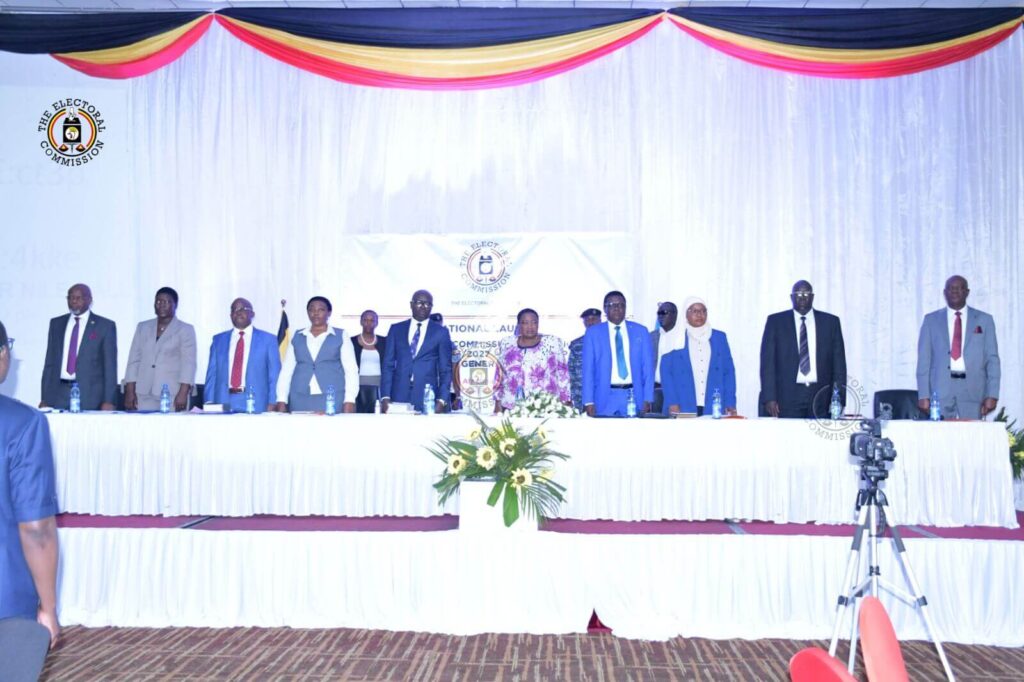
Nomination Dates:
– Oct 2-3: Presidential
– Sept 16-17: Parliamentary
– Sept 3-12: District chairs and mayors
– July 14-15: Municipality, sub-county, and town council Special Interest Groups (SIGs)
– June 2-10: Village-level SIGs
Presidential, parliamentary, and local government elections will be held between January 12 and February 9, 2026, with preparations costing Shs1.3 trillion.
Approved key Roadmap milestones to the 2025-2026 General Elections @PaulBukenya @ckaheru @ubctvuganda @nbstv @ntvuganda @newvisionwire @DailyMonitor @ChimpReports @bbstvug @FDCOfficial1 @NRMOnline @NUP_Ug @TheAllianceUG @DPSecretariat1@bukeddetv @CapitalFMUganda#ECRoadMap2026 pic.twitter.com/jKNJ5VvDQB
— The Electoral Commission – Uganda (@UgandaEC) August 2, 2023
Editor’s Note: If you come across any inaccurate or outdated content, kindly reach out to us at press@nowthendigital.com for immediate assistance.
You’re reading nowthendigital.com — which breaks the news about Uganda, Kenya, Nigeria, South Africa and the rest of the world, day after day. Be sure to check out our homepage for all the latest news, and follow NOW THEN DIGITAL on YouTube, Google, Web Stories, Google News, Medium, LinkedIn, Twitter, Reddit, Pinterest, Linktr, Buy Me a Coffee, Truth Social, and Flipboard to stay in the loop.


